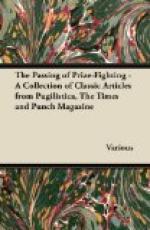’Out over London with a wild surmise,
Silent upon a seat of No. 10,’
or whatever the bally thing may be. But I never join their rash adventures. I belong to a different milieu. I move in a sort of social underworld. Not that I can deny, of course, that there is a certain amount of overlapping.”
“I overlapped twice to-day myself,” I said, “and as the second one was knitting a jumper—”
“And then there are the Tram-ites,” he went on. “I don’t understand their world either. The tram, I am told, suddenly plunges with a loud roar like a walrus under the streets of Holborn and emerges on the Embankment. The hansom cabs were called the gondolas of London. The trams, I suppose, are the submarines. But they are not of my life. I do not mingle with them.”
“I mingled with a tram once,” I said. “I clasped it warmly by the rail as it was going by, but I missed the step with my foot. It spurned me rather badly. But kindly explain what you’re driving at.”
“All these classes,” said Charles, “have their own friendships, their own jolts and jars, their own way of being bullied by conductors and thrown into the mud and squeezed into cages and arranged upon straps. But they have one great thing in common, distinct though they may be. They are all passengers, all takers of tickets. There is going to be a Bus Union, a Tube Union, and a Tram Union, and when necessary they will combine.”
“Against what?”
“Against the motorists, first and foremost,” said Charles. “The opulent people who ride a-wallop to their offices in cars. Suppose that Ethelinda Bellairs, who is a trifle absent-minded, has got the sack for typing a letter like this: ’I beg to acknowledge the receipt of your communication of the 25th ult., and ask you to note that a sudden sense of indefinable yearning seized Hephzibah. She closed her eyes and slowly swayed towards him. Awaiting the favour of an early reply, etc.’—what happens? There is an immediate strike of the Bus Union until she is reinstated. If necessary the two other branches of the Amalgamated Society of Passengers are called out. No case of hardship will be too insignificant for the A.S.P. We shall all carry a symbol in the shape of a secret season ticket. When the strike occurs nobody will go to work in the morning. All the stations and starting-places will be picketed; business will be paralysed.”
“Except for the stout fellows who walk,” I suggested.
“They will find it very lonely at their offices,” said Charles. “Nobody wants to work if there’s any excuse to avoid it, and the beauty of the thing is that we can strike not only against ordinary employers, but against the raising of fares, and against the N.U.R. or the Vehicle and Transport Workers Union itself. That will be the quickest strike that has ever been struck. You can’t go on banging lifts and gates and rushing about in empty buses without anybody to shove into the dirt or any thumbs to snip bits out of. It takes all the enjoyment out of life.”




